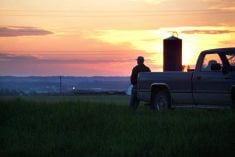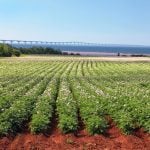Their parents can probably be forgiven for assuming that a farmer growing five acres of strawberries in southern Ontario can t possibly have anything to teach a young farmer breaking into large-scale production on the Prairies.
Even Christie Young, executive director with Ontario s FarmStart, describes her ideas about small-scale, new farmers as unique. But when you look at them juxtaposed with the concerns of Saskatchewan s Andrew Monchuk (see What is it Young People Want, page 24), you can see that for the most part young farmers are all in this together.
Read Also

The big squeeze: How to be fair to siblings during farm succession
Managing sibling business relationships on family farms.
First, though, you need to know that all of the members of the non-profit FarmStart organization are either immigrants, young people from non-farming backgrounds, or older second-career farmers. In fact, FarmStart s mandate is to serve only these demographics, and to increase their presence and enhance their chances of success.
FarmStart supports the ideals of local markets, short supply chains, and even shorter value chains. Its members typically farm small acreages of higher value crops, and they promote ecological agriculture which, according to Young, doesn t only mean organic. Almost all FarmStart members come at farming from an environmental or social perspective, and they are seeking meaningful careers and opportunities for community stewardship.
Certain people who weren t born on a farm or who have farmed elsewhere make really good farmers, Young says. And while FarmStart has helped many get a start with their incubator farm program, only 25 per cent of those who dream of farming will actually get there, she says.
While conventional farming types might be rolling their eyes about now, it s important to understand these people mean business. They are different than the back-to-the-landers, Young says. These are serious entrepreneurs who believe in the purpose and value of farming. But they are also coming to it with the intention to build a business, be their own boss, and make decisions.
It seems these goals aren t so different from Andrew Monchuk s. So if the goals are the same, and the basic production concept is similar, maybe it s true that there s more that the different ends of Canada s young-farmer demographic can learn from each other.
After all, the main commonality is that getting into farming isn t easy for anyone, whether you re born on a farm or not. It takes a spark, and maybe that spark is transferable.
FarmStart participants approach farming with the long term goal of earning their livelihood through their efforts. This differentiates them from hobby farmers who have been taking some flack in southern Ontario and B.C. for driving up land prices and wasting prime agricultural land. And while Farm- Start members may require off-farm income until they get their heads above water, so too do many young Saskatchewan farmers working their way into a 10,000-acre operation.
While the entire sector faces transitional challenges regarding farming s capital requirements, new farmers have to make a bigger leap because they come to it without family backing and so are searching for lower risk avenues to get into the business. Many FarmStart and incubator farms start small and lease a large portion of what they farm. They can then scale up incrementally. They are also forming co-operatives, joint ventures and partnerships with other new entrants.
This is, of course, if land is available. In southern Ontario and B.C., speculators have bought up land and taken it permanently out of agricultural production, leaving little opportunity for the kinds of small farm initiatives Young is talking about.
We have to get to retiring farmers before they have a crisis and sell to investors, she says. Often they would prefer to sell to a new farmer but the turnaround is too quick for that new farmer if it s not planned ahead. She d like to see government policy developed that keeps agricultural land in the hands of farmers, security of land tenure, and possible public land ownership designed to help new entrants.
New and young farmers need a break, Young says. They need patient capital, they need venture capital to be extended to the agriculture sector, and they need better help with succession planning.
Seventy-five per cent of farmers will retire in the next 10 years, and 60 per cent of those have no successor, Young says. It s unprecedented, and what does it mean? I think we have some huge readjustments to make to support a new generation of farmers. CG
———
These are serious entrepreneurs who believe in the purpose and value of farming. Christie Young














